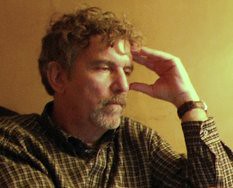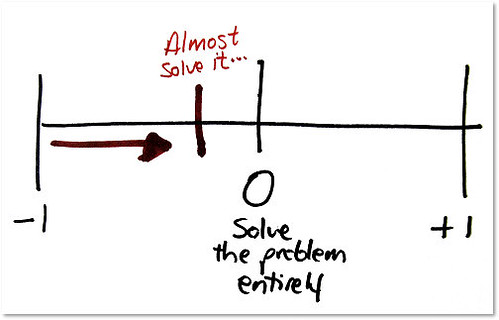
The War on Drugs. The War on Poverty. The War on Illegal Immigration.
Fixing a dysfunctional board. Team-building to boost employee morale.
What do all these things have in common?
If you answered, “None of them have solved the problem,” you would be right. Decades of fighting drugs, poverty, illegal immigration; decades of trying to fix “the problem with boards,” or any other organizational problem – if these problems had been solved, we wouldn’t still be hearing about new efforts to fix them!
Yes, an individual user has gotten off drugs. An individual organization has become financially solid. An individual single mom has raised herself and her family out of poverty. But overall, the problems these initiatives have sought to solve are all still with us, leading the most jaded among us to just give up.
“Boards will never change.”
“The poor will always be among us.”
“Employees anymore just don’t care.”
Problem-Solving Doesn’t Solve Problems
There are many reasons problem-solving does not solve large systemic problems.
For one thing, what we call “problem-solving” is really symptom-solving. Drug use is not the end problem but a symptom of something larger. The same is true of illegal immigration, of employee morale.
Yet we continue to problem-solve narrowly, sometimes myopically. We take problems out of the larger context that created them, addressing them in a vacuum that ignores all the interdependent and interconnected issues that create and maintain that problem.
Sometimes we create these narrow “solutions” because they are all we can wrap our minds around. Or because the rest is outside our mission. Or because there is no funding or political will to do more than that.
And sometimes those narrow solutions spring from well-intentioned “Eureka” moments by folks who truly believe they have found the answer. (The latest poverty-fighting example being micro-lending.)
By definition, problem-solving is reactive. As we move forward in those reactive plans, new circumstances arise for which we did not plan. We then react to those circumstances, often entirely scrapping the old plans to fit this new information.
It should therefore be no surprise that the law of unintended consequences seems to negate virtually every problem-solving step we take. As we try to predict what might happen, things change before our eyes. When we throw up our arms and decide to just do something – because doing “something”has to be better than doing nothing – that “something” fails to hit the mark.
And the cycle of “things will never change” and “we’ll never be able to do enough” continues.
The Problem with Problem-Solving
The real problem for those of us doing Community Benefit work, though, is that we aim at problem-solving as if it were the holy grail. The ultimate, almost whispered Pollyanna-ish goal is to dare to dream of ending poverty, ending disease, ending misery and suffering.
And while those dreams are admirable, they are zero-sum dreams.
Grade school math tells us that eliminating a negative does not achieve something positive. -1+1 does not equal a positive number; it equals zero.
Ending poverty. Ending hunger. Ending homelessness.
Ending drug use. Ending illegal immigration.
Ending board apathy. Getting boards to stop micromanaging. Finally meeting our budget.
When we are problem-solving, the best result we are aiming for is zero.
BUT wait, there’s more!
Because we assume we will never reach our ultimate goal (ending poverty), we create incremental plans, hoping to “increase our ability to meet the demand for food boxes by 50% over the next year.”
The result, then, is that problem-solving is a reactive, incremental approach that at best aims at zero as its final goal, and more often aims below zero as its best possible outcome.

So – now that we know what doesn’t work, what will work? Find out in Part 2!

Hildy, great post, again.
Most problems occur when someone takes a fixed point of view, and tries to create the world to fit that fixed point of view. A fixed point of view is where you believe you have the answer. What if you could perceive what was going on, rather than “thinking” about it. Have awareness, not judgement?
So, if a Fixed Point of View is how you solve a problem, what Point of View would you have to have, to unfix the problem? Hmmmmm….
Hmmmm indeed, Steve! 🙂
I look forward to your thoughts when I post Part 2 tomorrow!
HG
Steve, as I read this, I am reminded of the fact that nearly all airplane accidents are the result of chains of events. In general aviation, most accident chains are 7 or 8 links deep. Yet, when you read the NTSB reports, they say things like cause: uncontrolled flight into terrain. In other words, the plane spiraled into the ground. But his wasn’t the cause, it was the result of who know what all? Often the accident change maps all the way back tot he day or week before the accident happened.
This is the case with most problems… Most of the problems people fight to solve are results, not causes. I look forward to post tomorrow 🙂
drew
I think the idea of the best result being zero is frightening to some Community Benefit organizations. Zero means that there may no longer be a reason for the organization(s) to exist. Is it possible that without intending to, Community Benefit organizations have created a self perpetuating systems to “solve problems” rather than cease existing?
How would it feel to be able celebrate that zero result and then take aim at a new challenge instead?
Hey Nancy,
True….
What would it be like if we had gratitude for what we had…… and what else can we add?? If we had gratitude for all that worked well…and…what else is possible?
If we functioned from that state of curiosity…..????
They are the Board members and executives that truly make a difference
To Nancy’s question about organizations crating self-perpetuating systems rather than cease existing, I would say this is absolutely true. As I think about the organizations I have worked with, the presumption and drive towards permanence and growth as an organization vastly overshadows any consideration or conceptualization of achieving obsolescence, which would be a true mark of success.
Wow – I’ve never been good at math, but I totally get “zero-sum dreams”.
And Steven’s questioning:
“What would it be like if we had gratitude for what we had…… and what else can we add?? If we had gratitude for all that worked well…and…what else is possible?”
These questions flip the math so that it works in everyone’s favor.
John
Hi Hildy,
I agree in principle with your central thesis that problem-solving approaches do not address the challenges of drugs, poverty, immigration, etc, that we are seeing in the world.
My take on problem solving is that it does indeed solve problems – provided that the problem qualifies as a problem – bounded, solvable, discrete, etc., – and is not attempting to problem solve a mess (problems nested inside complex systems) or a wicked messes (complex systems coupled with high social complexity) because it fails to deal with the phenomena of fragmentation. This is only slightly different wording from what you offer above.
Messes and wicked messes call for fundamentally different mindset, skillset and approach then what is offered by problem solving. But because we are good at problem solving, we tend to frame the world as a set of problems out there waiting to be fixed.
I have my own view on how this might be more effectively remedied, but I look forward to learning from yours.
Thanks for putting your thoughts out there,
Ken
Ken:
Thanks for this very thoughtful reply. And yes, my reference to large systemic problems could equally be called messes – and often are!
I look forward to our continuing the conversation. (Have you read the other parts of the post? Part 2 is here: http://hildygottlieb.com/2009/04/14/why-problem-solving-doesn%E2%80%99t-solve-problems-part-2/)
Thanks again!
HG
I don’t have to wait for part two … The premise is incorrect.
The problems will never be solved because the yardsticks with which you measure the goals are relative. In any group if people, one will always be shortest or oldest, and we will always call the shortest one short. Poor is quite similar. In any group of people, one will always have the least, so one will always be considered poor. The only way to change that is to force, not equality, but uniformity. Send in the clones!